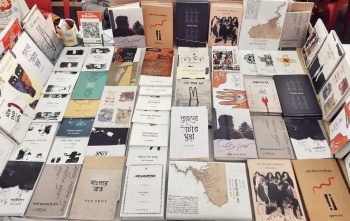Angshuman Kar
Angshuman Kar

Display of Little Magazines at the Kolkata Book Fair.
Call from the Underworld
“I’m calling from the underworld, can you hear my words
I’m calling from the underworld, can you hear my call?”
“Calling from the Underworld,” by Shakti Chattopadhyay, translated by Arunava Sinha
This special Bengali feature of Muse India is designed to map the development of post-Independence Bengali poetry of West Bengal. It will give the readers an idea of the gradual development of Bengali poetry in West Bengal in the last 75 years by examining its journey to a crossroads from which it will, perhaps, now move on in different directions.
In Bengal, the development of poetry, especially after Rabindranath Tagore, is usually mapped in terms of its journey through decades. Though there can never be watertight compartments between decades, Bengali critics usually read the poetry of one decade separating it from that of another. This is the practice that this feature has also followed for the sake of convenience. This, however, does not mean that there has not been any link between, say, the poetry of the 1950s and that of the 1960s. The essays curated in this feature rather prove the opposite.
As the editor of this feature, I wanted to make poets write on poetry. Except for Subhadeep Ray, all the contributors to this feature are well-known Bengali poets writing either in Bengali or English. It is an accident that some of them also teach English. Other than the seven main essays that map the development of Bengali poetry through different decades after Independence, this feature contains two other essays that need to be mentioned. One of these essays written by Maitrayee Bhattacharjee gives an overview of the important movements of Bengali poetry and the other, written by this author, tries to capture the journey of post-Independence Bengali poetry in snippets. These two essays should be read as introductory pieces to the feature.
The feature does not contain any essay on Bengali Dalit poetry. Bengali Dalit poets, such as Manohar Mouli Biswas, Kalyani Thakur Charal and Manju Bala are recently drawing the attention of larger audiences. Bengali Dalit literature itself is a recent phenomenon. The establishment of the Bengali Dalit Sahitya Academy and the literary festival that the Academy organises every year have been a real boost to the visibility of Bengali Dalit literature. Some poets who did not seem to bother about their Dalit identity earlier are strongly claiming that identity now. However, the time is not yet ripe to keep a separate essay on Bengali Dalit poetry in this feature. This is why it abstains itself from any such endeavour.
Though the essays curated in this feature prove the poets’ continuous negotiation with ever-changing socio-politico-cultural realities, writing poetry ultimately is an isolation exercise. To the readers, it reaches like a call from the underworld. I hope that the readers reading this feature (and not Bengali poetry itself) will also be able to hear this call that comes from the underworld of the Bengali poets of West Bengal in the post-Independence era. The feature is designed to make this underworld surface, to enable the readers to hear its call more distinctly.
Wish you all a happy reading.

Issue 114 (Mar-Apr 2024)
-
EDITORIAL
- Angshuman Kar: Editorial Comment
-
ARTICLES
- 01. Angshuman Kar: Post-Independence Bengali Poetry of West Bengal and Railway Tracks
- 02. Maitreyee B Chowdhury: Revolution in Bengali Poetry
- 03. Parthajit Chanda: Bengali Poetry of the 1950s - A Mysterious Archipelago
- 04. Himalaya Jana: Fallen Butterflies, Resurrected Words - The Poetry of the Sixties
- 05. Chirantan Sarkar: Poems of Defiance of the 1970s
- 06. Hindol Bhattacharya: Between the Idea and the Reality: Situating the Poetry of the 1980s
- 07. Mandakranta Sen: Bengali Poetry – The Last Decade of the Last Century
- 08. Subhadeep Ray: Shunya as a Beginning - Journeys and Ruptures in Bengali Poetry of the First Decade of the Twenty-first Centuryi
- 09. Ashish Gangopadhyay: Reshaping of Bengali Poetry in the Second Decade of the Twenty-first Century: Emerging Trends and New Directions
